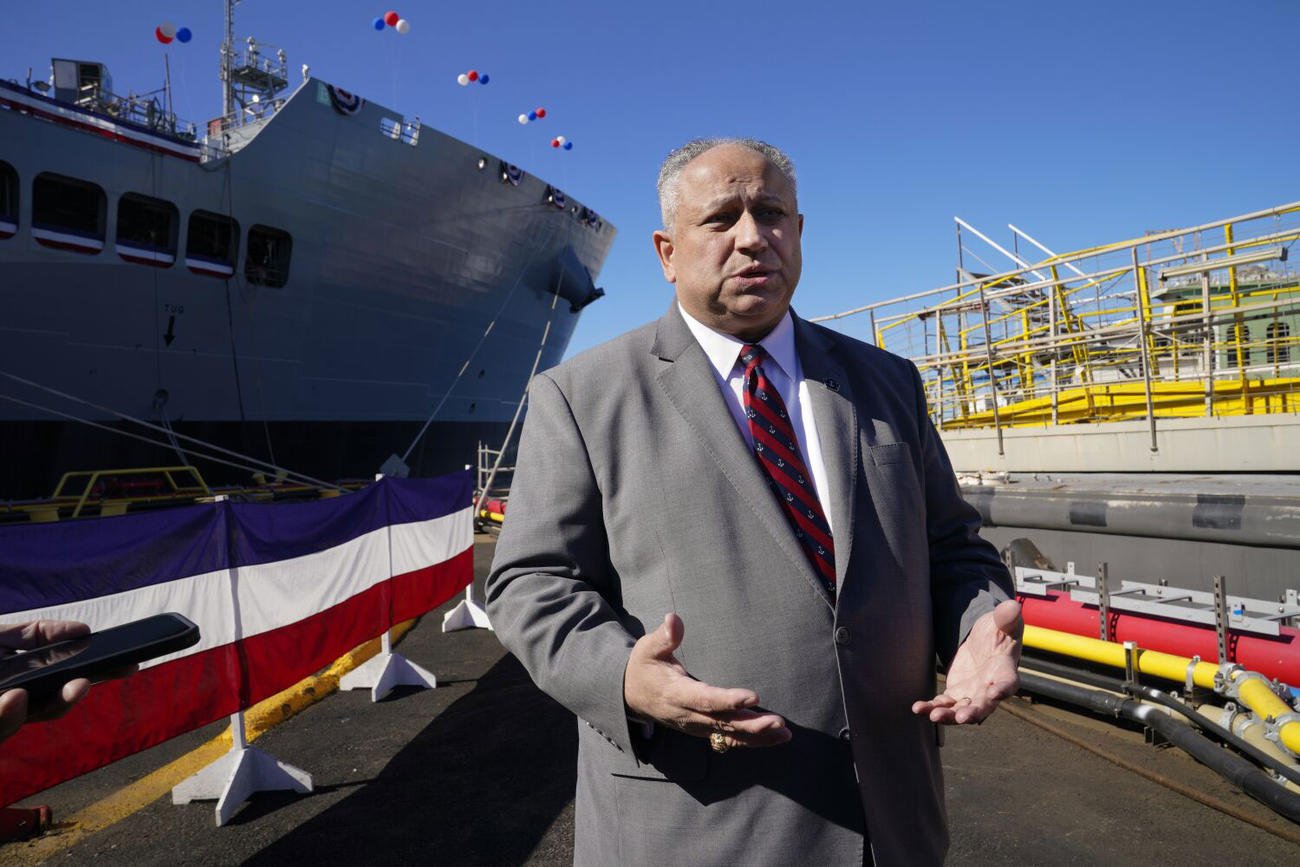
Earl Warren, the late Supreme Court Chief Justice who presided over society-shaking civil rights changes in the 1950s and 60s, including ending racial segregation in public schools, was honored Saturday in San Diego by the Navy which christened a 746-foot fuel ship in his name.
The act was carried out with a hearty swing of a champagne bottle in front of a private audience of 300 people at General Dynamics-NASSCO, the ship’s builder.
Acting on behalf of the Navy, Supreme Court Justice Elena Kagan slammed the bottle against the gunmetal gray hull of the USNS Earl Warren, causing a frothy explosion that left her covered in bubbly.
“If you ask, well, who is it that contributed so greatly to the civil rights struggle, and particularly to the struggle to ensure racial equality in our nation, Earl Warren has got to be among the top people on the list,” Kagan said.
She said his greatness was particularly apparent in 1954 when the so-called “Warren Court” unanimously ruled in Brown v. Board of Education that state-sanctioned segregation in public schools violated the 14th Amendment.
Before the ruling, schools could segregate Blacks and Whites, provided that their facilities were equal.
Segregationists called for Warren’s impeachment at a fraught moment in American history.
“We live in one society, a society in which people of all races are treated with equal dignity and equal respect,” Kagan said. “In 1954, none of that was inevitable.”
Saturday’s christening represented something of a history lesson about Warren — who was elected governor of California three times. It was also emblematic of a shift in tradition for the Navy.
Historically, most Navy vessels have been named after war heroes, battles, presidents, states, cities, counties and lawmakers. Navy Secretary Ray Mabus, a Mississippi native, shook things up more than a decade ago when he started naming a significant number of cargo and fuel ships after civil rights and human rights leaders.
Some people accused him of politicizing the naming of ships. He disagreed, saying in 2016, “I think you have to represent all the values that we hold as Americans, that we hold as a country. And so that’s why I’ve named ships the Medgar Evers, Cesar Chavez, John Lewis, the Harvey Milk. Because these are American heroes too, just in a different arena.”
All four of those ships were built at NASSCO. So was the Earl Warren. The company is building or will build vessels bearing the names of Robert F. Kennedy, Lucy Stone, Sojourner Truth, Thurgood Marshall and Ruth Bader Ginsburg.
The influence of Mabus and Warren was applauded at Saturday’s ceremony by current Navy Secretary Carlos Del Toro, a Cuban immigrant.
“America represents a fierce and stubborn belief in a society governed by principles, grounded in justice, human rights,” he said. “We’re still a nation in pursuit of a more perfect union.”
Warren may not be a familiar name to some younger Americans. He was born in Los Angeles in 1891 and grew up in Bakersfield, where his interest in becoming a lawyer arose before he even reached high school. He used to ride his bike to court trials.
He went on to earn undergraduate and law degrees at UC Berkeley. Warren, who had a medical condition, later joined the Army and served stateside during World War I.
After that, his legal career took off. He became district attorney of Alameda County, then attorney general of California. As historians note, he was a Republican who was conservative on fiscal matters but progressive on social issues. That helped him to become the only person ever elected governor of California three times.
His ambitions extended beyond the Golden State. In 1948 he was Thomas Dewey’s running mate when Dewey made an unsuccessful run for president. Warren made an unsuccessful bid for president in 1952.
The following year, President Dwight Eisenhower, a Republican, appointed Warren to be the 14th Chief Justice of the Supreme Court. It was, to Eisenhower’s surprise, the start of the so-called “Warren Court,” which famously made a long string of liberal rulings affecting everything from matters of church and state to the First Amendment to how political districts are drawn up.
The court also ruled in Miranda v. Arizona that criminal suspects must be told their rights before they are interrogated. Countless police shows on TV have made people aware that they have the right to remain silent, that anything they say can be used against them in court, that they have a right to an attorney, and that they will be provided an attorney if they can’t afford one.
On Saturday, Del Toro helped bring the ceremony to an end by citing one of Warren’s best known quotes — a remark with a nautical flavor: “In civilized life, law floats on a sea of ethics.”
This story originally appeared in San Diego Union-Tribune.
©2023 The San Diego Union-Tribune. Visit sandiegouniontribune.com. Distributed by Tribune Content Agency, LLC.
Show Full Article
© Copyright 2023 The San Diego Union-Tribune. All rights reserved. This material may not be published, broadcast, rewritten or redistributed.
Tags: Bearing Chief Christens Court Earl Justice Legendary Massive Military Navy Navy News Ship Supreme Warren Working Warriors








